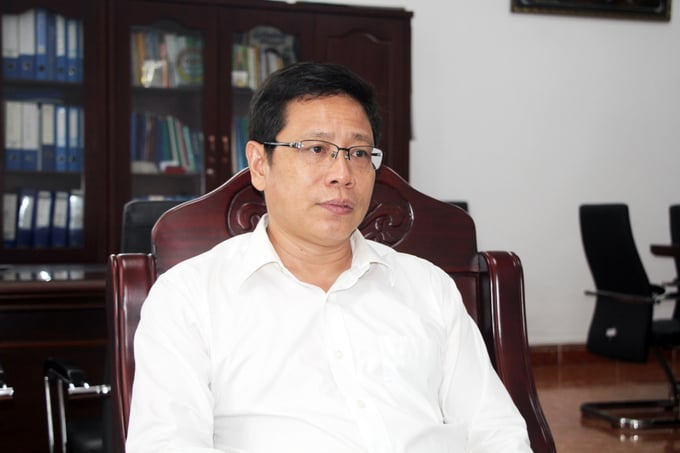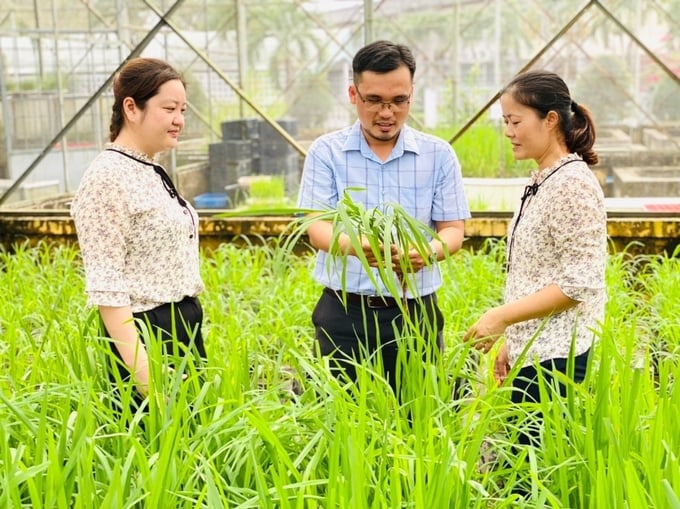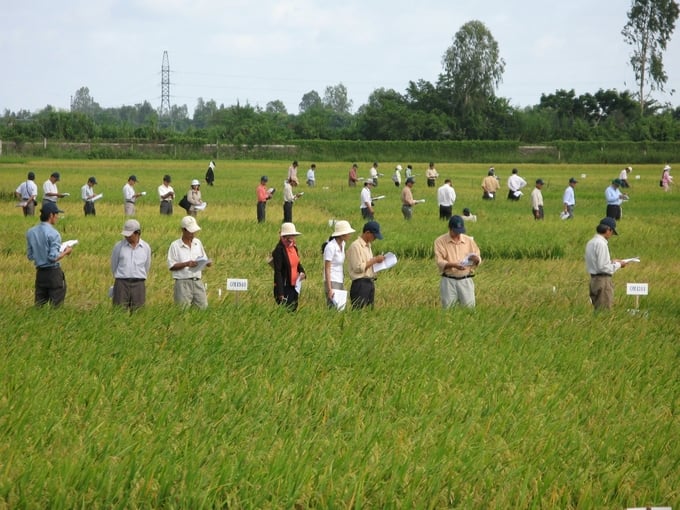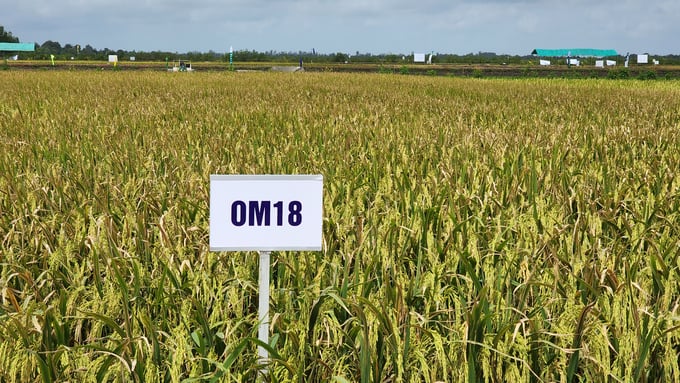June 15, 2025 | 19:48 GMT +7
June 15, 2025 | 19:48 GMT +7
Hotline: 0913.378.918
June 15, 2025 | 19:48 GMT +7
Hotline: 0913.378.918

Dr. Tran Ngoc Thach, Director of the Mekong Delta Rice Research Institute. Photo: Kim Anh.
Mekong Delta Rice Research Institute (MDRRI) is the foremost institution conducting scientific research on rice plants and rice soil cultivation systems. Can you elaborate on your human resource training and development as well as your high-level, highly-qualified scientists in keeping with the formation and development progress?
In 1977, the Mekong Delta Rice Institute was founded. The Institute of Food Crops mobilized a new generation of "leading" government officials. Young graduates from Ho Chi Minh City, the North, and Can Tho University began to enter the Institute over time.
In the initial phase, the Mekong Delta Rice Institute received substantial support from the Indian Government's training program, and a number of institute employees were sent to India for training. Indian experts and scientists have made significant contributions to the Institute's development, it can be said. They dispatched experts to reside, work, and directly direct the scientific team.
Second, we must acknowledge the significant contribution made by scientists at the International Rice Research Institute (IRRI). From exchanging materials to sending staff from the Mekong Delta Rice Institute to IRRI for short-term and long-term study, the Mekong Delta Rice Institute and the International Rice Research Institute work closely together.
Future generations of scientific personnel will receive a more extensive and comprehensive education. Through international and intergovernmental cooperation programs, the Institute's scientists have the opportunity to receive scholarships, enhance their English, and study abroad in the Philippines, Thailand, the Republic of Korea, China, Japan, the United Kingdom, Italy, the United States, Australia, New Zealand, etc. They are establishing the Institute's training tradition. With this training assistance, the MDRRI would be able to address the staffing shortage.
From here, the Institute has assembled an outstanding group of genetic researchers and breeders. Currently, there are 30 scientists with doctoral degrees on the force. Most concentrate on genetics, biotechnology, or other breeding-related disciplines.
In the context of gaining fiscal independence, the Institute continues to enhance its quality, restructure its organizational structure, streamline its staff, and expand its responsibilities to encompass all of its divisions.

The Mekong Delta Rice Research Institute has built a strong team of scientists, focusing on genetic selection, biotechnology, and other fields related to breeding. Photo: Le Hoang Vu.
Can you describe the transition in rice breeding to meet quality standards based on production conditions acclimated to climate change and global consumption trends?
Initially, the concentration of the state budget for the MDRRI was on diversification, but in recent years, the emphasis has shifted to varieties. As variety selection flourishes in Vietnam, it has become one of the country's most notable fields.
Previously, the Mekong Delta was home to three notable varieties: MTL from Can Tho University, OM from MDRRI, and IR from IRRI. Can Tho University is renowned for the introduction of the MTL rice variety. Later, as the university's emphasis shifted to teaching, the MTL variety began to decline and the OM variety of the MDRRI began to increase.
After properly training the next generation of MDRRI scientists, the Institute began collecting seasonal rice varieties, importing improved rice varieties from abroad, improving farming processes, and establishing its own breeding program with a focus on growth rate, yield, and pest resistance. Since then, the Institute has mastered all technologies, including restoration, traditional hybridization, the use of molecular markers, gene transformation, and gene editing.
In the 1990s, the Mekong Delta Rice Institute began producing the first rice varieties and promoting their role in preventing flooding and saltwater intrusion, such as the OMCS variety, which has an exceptionally brief growing period of 85 to 90 days, allowing farmers to be flexible with their seasonal arrangements. In later phases, drought, salinity, and inundation played a larger role in the research and breeding of rice varieties. To date, the Mekong Delta Rice Institute has selected and introduced into production more than 180 rice varieties of all types, with the area planted with OM rice varieties (OM5451, OM18) accounting for 60 to 75 percent of the Mekong Delta and playing a crucial role in Vietnam's rice exports.
MDRRI's work of breeding and selecting seedlings has been passed down through generations, and it is distinguished by a system of material sources preserved for many years, a team of well-trained scientists, and equipment used to develop stable, long-lasting varieties. The introduction of new rice varieties ensures the following conditions: resistance to sodium alum, drought, heat, inundation, high yield, quality, and climate change adaptation.
Since then, the function of the Institute has been reaffirmed, and numerous rice varieties have been developed from local summer rice genetic resources and wild rice in a collection of more than 3,000 samples preserved and utilized by the Institute. These rice varieties have a brief growing period of 85 to 100 days, a high yield potential, and are adapted to the ecological sub-regions of the Mekong Delta and other regions.
Breeding efforts are also being modified to diversify rice quality in order to meet market demands and adapt to environmental conditions. This transformation has helped increase the proportion of fragrant rice varieties and high-quality rice used in Mekong Delta production to approximately 70%, and the average rice yield to nearly 6 tons per hectare.
With the potential to construct a gene bank, the Institute continues to collect and maintain nearly 2,000 local summer rice varieties, 2,000 to 3,000 improved varieties. Rice varieties are periodically planted and utilized in the Institute's breeding programs.
The Institute overcame numerous early obstacles and established itself as a pioneer in scientific research on rice in the Mekong Delta. This is the consequence of the tireless efforts of the MDRRI's personnel and scientists over many generations.
In the current environment, there are numerous opportunities for the rice industry to increase income for producers and strengthen the Vietnamese rice brand on the international market. How should the MDRRI design its development strategy to adopt and promote this mission?
In light of the effects of climate change, the rising cost of agricultural materials, the shrinking rural labor force, and the need to increase farmers' incomes, the Mekong Delta Rice Institute presents numerous issues that must be addressed. technically speaking. In addition, the transformation of the operating model towards self-control, competition in scientific research, and rising demands for research products in production necessitate that the Institute adapt its management principles, modes of operation, and multidimensional approaches to research to new realities.
The Institute organizes demonstration programs for novel rice varieties every crop and every year, particularly for the winter-spring crop. This strategy is highly effective. The purpose of the initiative is to introduce rice varieties with exceptional production benefits to farmers, cooperatives, local professional agencies, seed producers, and rice exporters. This is a connection channel that promotes investment and the development of new rice varieties. And each segment of rice contains promising rice varieties.

Every crop, every year, the Mekong Delta Rice Institute organizes demonstration programs of new rice varieties. Photo: Mekong Delta Rice Research Institute.
If in the past we rushed to recognize varieties, we now return to selecting varieties to promote high production efficiency, not to produce products that compete with one another. In addition, we conduct research and create rice varieties to solve problems that businesses have not been able to solve, such as breeding rice varieties that use fertilizer more efficiently and rice varieties that can be grown in low temperatures. Still, persistent flooding can reduce greenhouse gas emissions.
What prospective rice varieties does the MDRRI currently possess and develop?
Currently, the set of rice varieties exists and is expanding, with OM18 and OM5451 making the most significant contributions. Also within this segment, we are advancing the development of the approved OM429 and OM34 varieties.
As for the Japonica rice variety, DS1 is presently being cultivated extensively, but there are time-related issues. We are attempting to finalize the recognition of the circulation procedure for the variety OM46, which has a shorter growth period, good yield, and development potential and overcomes some of the limitations of the DS1 variety.

The OM rice variety, bred by the Mekong Delta Rice Research Institute, is widely planted in the Mekong Delta and has become the main rice variety for the export market. Photo: Kim Anh.
With the type of sticky rice, the Long An sticky rice variety (IR4625), or the principal CK variety cultivated in An Giang province has begun to exhibit signs of production decline. We are in the process of developing new varieties of sticky rice by selecting for traits that are superior to those already present.
We have recently authorized the OM8 variety for distribution in the premium rice market. This variety of rice, characterized by its long, fragrant grains and soft texture, is expected to be put into production.
Thank you!
Translated by Linh Linh

(VAN) The working delegation from the Ministry of Agriculture and Environment conducted an important trip to the Netherlands to strengthen strategic partnerships and sustainable development in the agricultural sector.

(VAN) The letter ‘A Plea from the Ocean’ not only evokes emotion but also awakens the human conscience to the responsibility of protecting life on Earth.

(VAN) The Department of Agriculture in South Africa has announced the country’s first mass vaccination of poultry to prevent local birds from contracting avian influenza.

(VAN) Establishment of the Mekong Delta Regional Agricultural Linkage Center, aiming for a closed value chain, deep processing, trading platforms, and international market connectivity.

(VAN) Gia Lai province has recently recorded 460 rare species of animals and plants, contributing to forest conservation and biodiversity planning in the region.

(VAN) Ms. Caroline Beresford, New Zealand Ambassador to Vietnam, expressed confidence that agricultural cooperation between Vietnam and New Zealand will develop sustainably, be climate-resilient, and promote gender equality.

(VAN) Vietnam reaffirms its commitment to international cooperation in fostering sustainable and responsible fisheries while ensuring resilient livelihoods for small-scale fishing communities.